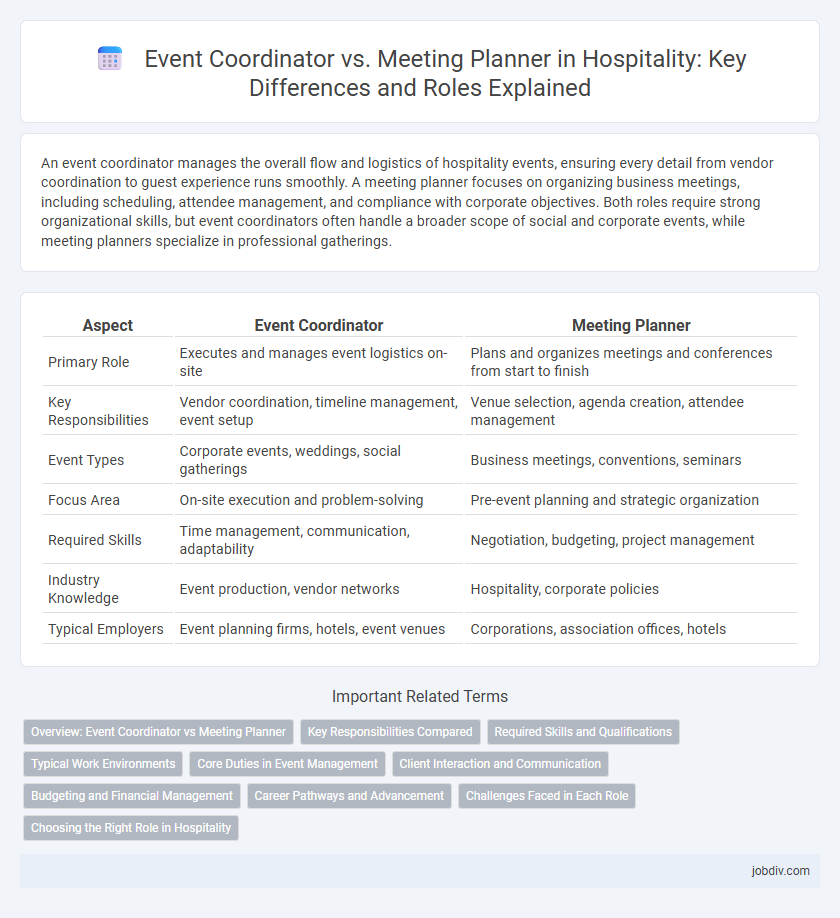An event coordinator manages the overall flow and logistics of hospitality events, ensuring every detail from vendor coordination to guest experience runs smoothly. A meeting planner focuses on organizing business meetings, including scheduling, attendee management, and compliance with corporate objectives. Both roles require strong organizational skills, but event coordinators often handle a broader scope of social and corporate events, while meeting planners specialize in professional gatherings.
Table of Comparison
| Aspect | Event Coordinator | Meeting Planner |
|---|---|---|
| Primary Role | Executes and manages event logistics on-site | Plans and organizes meetings and conferences from start to finish |
| Key Responsibilities | Vendor coordination, timeline management, event setup | Venue selection, agenda creation, attendee management |
| Event Types | Corporate events, weddings, social gatherings | Business meetings, conventions, seminars |
| Focus Area | On-site execution and problem-solving | Pre-event planning and strategic organization |
| Required Skills | Time management, communication, adaptability | Negotiation, budgeting, project management |
| Industry Knowledge | Event production, vendor networks | Hospitality, corporate policies |
| Typical Employers | Event planning firms, hotels, event venues | Corporations, association offices, hotels |
Overview: Event Coordinator vs Meeting Planner
Event coordinators specialize in managing the logistics of various social and corporate events, ensuring smooth execution from start to finish. Meeting planners focus primarily on organizing professional meetings, conferences, and conventions, including venue selection, agenda creation, and attendee management. Both roles require strong communication skills, budget management, and vendor coordination but differ in scope and event type specialization.
Key Responsibilities Compared
Event Coordinators primarily manage the logistics and onsite execution of events, ensuring smooth operations from setup to teardown. Meeting Planners focus on strategic planning, including venue selection, budget management, and coordinating with stakeholders to align event objectives. Both roles require strong communication skills, but Event Coordinators emphasize operational detail while Meeting Planners concentrate on overarching event strategy.
Required Skills and Qualifications
Event Coordinators require strong organizational skills, attention to detail, and proficiency in budgeting, vendor management, and client communication, often holding a degree in hospitality or event management. Meeting Planners emphasize expertise in contract negotiation, logistics coordination, and technology use for virtual or hybrid meetings, usually needing certification such as CMP (Certified Meeting Professional). Both roles demand excellent interpersonal abilities, time management, and problem-solving skills tailored to managing large or complex gatherings within the hospitality industry.
Typical Work Environments
Event coordinators typically work within dynamic venues such as hotels, conference centers, and resorts, managing on-site logistics and vendor relations to ensure smooth event execution. Meeting planners often operate in corporate offices or specialized agencies, focusing on strategic planning, budgeting, and client consultations for business meetings and conventions. Both roles require adaptability to fast-paced environments and strong organizational skills to handle complex schedules and diverse stakeholder needs.
Core Duties in Event Management
Event Coordinators manage on-site logistics, vendor coordination, and day-of operations to ensure seamless event execution. Meeting Planners focus on the strategic aspects, including agenda setting, budgeting, and client communication to align event goals with organizational objectives. Both roles require expertise in timeline management, contract negotiation, and stakeholder collaboration within the hospitality industry.
Client Interaction and Communication
Event Coordinators engage clients throughout the planning process, ensuring detailed communication to align event goals with logistical execution. Meeting Planners concentrate on professional settings, emphasizing precise communication to manage corporate client expectations and facilitate seamless coordination. Effective client interaction in both roles involves tailored communication strategies to address unique event requirements and stakeholder preferences.
Budgeting and Financial Management
Event coordinators oversee budgeting by allocating funds across vendors, venues, and services to ensure cost-efficiency within the overall event plan. Meeting planners specialize in detailed financial management, often negotiating contracts and managing expenses to align with strict corporate or organizational budgets. Both roles require precise financial oversight, but meeting planners typically handle more complex budget structures tied to business goals.
Career Pathways and Advancement
Event coordinators typically manage logistics and vendor relationships, focusing on day-to-day event execution, while meeting planners oversee strategic planning for conferences and corporate gatherings, often involving broader stakeholder engagement. Career progression for event coordinators often leads to senior coordinator or event manager roles, whereas meeting planners may advance into director-level positions or specialize in large-scale convention management. Both career paths offer opportunities to develop project management, budgeting, and client negotiation skills essential for advancement in the hospitality industry.
Challenges Faced in Each Role
Event coordinators frequently encounter challenges related to managing diverse vendor relationships and adhering to tight event timelines, requiring exceptional multitasking and negotiation skills. Meeting planners often face obstacles linked to handling complex logistics and ensuring attendee engagement across multiple sessions, demanding meticulous organization and communication expertise. Both roles require adaptability and problem-solving to overcome last-minute changes and ensure successful event execution.
Choosing the Right Role in Hospitality
Event coordinators focus on executing specific details and logistics on the day of an event, ensuring seamless operation from setup to breakdown. Meeting planners manage the broader scope of planning, including budgeting, venue selection, and vendor negotiations for business conferences or professional gatherings. Selecting the right role depends on whether you prefer hands-on event day management or comprehensive pre-event organization within the hospitality industry.
Event Coordinator vs Meeting Planner Infographic

 jobdiv.com
jobdiv.com